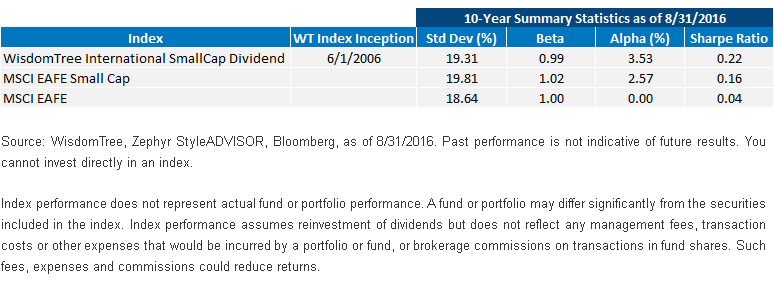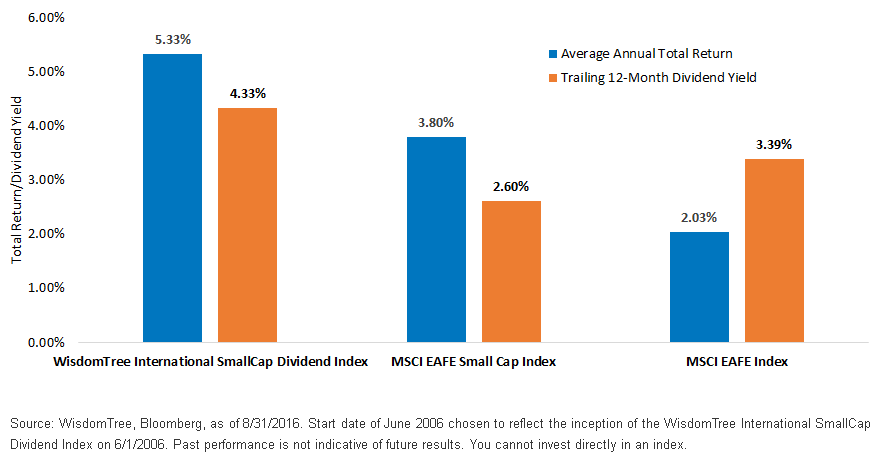Why International Small Caps Matter




 For definitions of terms and indexes in the chart visit our glossary.
Dividend-Weighting the Developed World
Back in June 2006, WisdomTree launched the ETF industry’s first international small-cap ETF, the WisdomTree International SmallCap Dividend Fund (DLS). We did so because we believed the tendency of small caps to outperform their large-cap counterparts over time (the so-called “size premium”) was a market phenomenon that could be observed not just in the U.S. but in international markets as well. DLS was unique not just because it was the first ETF that allowed investors to complete their developed world exposure but because it tracked a WisdomTree Index that used only dividend-paying companies and weighted them once a year based on the dividends they pay. Because there are typically more than 1,000 such dividend-paying small-company stocks, WisdomTree has created a small-cap vehicle that has immense investment capacity and has correlated highly to established cap-weighted indexes. However, because WisdomTree weights by dividends, the WisdomTree International SmallCap Dividend Index typically exhibits a higher dividend yield compared to the MSCI EAFE Index. Ten years later, the real-time results of the strategy confirm our earlier intuition. International small caps, dividend weighted, have outperformed the MSCI EAFE Index for the last 1-, 3-, 5- and 10-year periods. The table below shows annualized Index level returns from June 2006 through August 31, 2016, as well as the trailing 12-month dividend yields.
Average Annual Total Returns and Trailing 12-Month Dividend Yields, June 2006 through August 2016
For definitions of terms and indexes in the chart visit our glossary.
Dividend-Weighting the Developed World
Back in June 2006, WisdomTree launched the ETF industry’s first international small-cap ETF, the WisdomTree International SmallCap Dividend Fund (DLS). We did so because we believed the tendency of small caps to outperform their large-cap counterparts over time (the so-called “size premium”) was a market phenomenon that could be observed not just in the U.S. but in international markets as well. DLS was unique not just because it was the first ETF that allowed investors to complete their developed world exposure but because it tracked a WisdomTree Index that used only dividend-paying companies and weighted them once a year based on the dividends they pay. Because there are typically more than 1,000 such dividend-paying small-company stocks, WisdomTree has created a small-cap vehicle that has immense investment capacity and has correlated highly to established cap-weighted indexes. However, because WisdomTree weights by dividends, the WisdomTree International SmallCap Dividend Index typically exhibits a higher dividend yield compared to the MSCI EAFE Index. Ten years later, the real-time results of the strategy confirm our earlier intuition. International small caps, dividend weighted, have outperformed the MSCI EAFE Index for the last 1-, 3-, 5- and 10-year periods. The table below shows annualized Index level returns from June 2006 through August 31, 2016, as well as the trailing 12-month dividend yields.
Average Annual Total Returns and Trailing 12-Month Dividend Yields, June 2006 through August 2016
 Conclusion
WisdomTree believes international small caps should be a part of every globally diversified portfolio. As shown here, dividend weighting has efficiently captured the size premium while also raising the dividend yield compared to the market over more than a decade. It has added alpha above and beyond the MSCI EAFE Index, on an absolute and risk-adjusted basis, while exhibiting comparable volatility. Click to learn more about DLS.
Conclusion
WisdomTree believes international small caps should be a part of every globally diversified portfolio. As shown here, dividend weighting has efficiently captured the size premium while also raising the dividend yield compared to the market over more than a decade. It has added alpha above and beyond the MSCI EAFE Index, on an absolute and risk-adjusted basis, while exhibiting comparable volatility. Click to learn more about DLS.
Important Risks Related to this Article
There are risks associated with investing, including possible loss of principal. Foreign investing involves special risks, such as risk of loss from currency fluctuation or political or economic uncertainty. Funds focusing their investments on certain sectors and/or smaller companies increase their vulnerability to any single economic or regulatory development. This may result in greater share price volatility. Please read the Fund’s prospectus for specific details regarding the Fund’s risk profile.
Diversification does not eliminate the risk of experiencing investment losses.
Investments focusing on certain sectors and/or smaller companies increase their vulnerability to any single economic or regulatory development.



